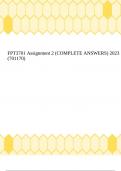FPT3701 Assignment 2 (COMPLETE ANSWERS) 2023
(701170)
, 1.1 Effective teaching can be defined as the ability of a teacher to facilitate meaningful and engaging
learning experiences that lead to the acquisition of knowledge, skills, and attitudes by students. It
involves employing various instructional strategies, techniques, and resources to meet the diverse
needs of learners and promote their academic, social, emotional, and cognitive development.
Effective teaching goes beyond simply delivering content; it encompasses creating a positive and
inclusive classroom environment, establishing clear learning goals, providing constructive feedback,
and fostering critical thinking and problem-solving skills.
1.2 The variables of effective learning are multifaceted and encompass various factors that contribute
to students' ability to learn and achieve desired outcomes. These variables include:
1.2.1 Motivation: Motivation plays a crucial role in effective learning. When students are motivated,
they are more likely to engage actively in the learning process, persist in the face of challenges, and
strive for excellence. Motivation can be intrinsic (driven by personal interest or curiosity) or extrinsic
(influenced by external rewards or recognition).
1.2.2 Engagement: Engaged learners are actively involved in their learning, demonstrating interest,
curiosity, and enthusiasm. They participate willingly in class activities, ask questions, seek
clarification, and take ownership of their learning. Engagement can be fostered through interactive
teaching methods, hands-on activities, real-world connections, and meaningful tasks.
1.2.3 Prior Knowledge: Students' prior knowledge serves as a foundation for new learning. Effective
teachers assess students' prior knowledge before introducing new concepts or skills to ensure
appropriate scaffolding and differentiation. By building upon existing knowledge and making
connections to real-life experiences, teachers can enhance understanding and retention.
1.2.4 Differentiation: Recognizing that students have diverse learning needs and abilities, effective
teachers employ differentiation strategies to tailor instruction to individual students or groups. This
may involve modifying content, process, or product based on students' readiness, interests, and
learning styles. Differentiation promotes personalized learning and maximizes student engagement
and achievement.
1.2.5 Assessment: Assessment is an integral part of effective learning. It helps teachers gather
evidence of students' progress, identify areas of strength and weakness, and make informed
instructional decisions. Formative assessments provide ongoing feedback to guide instruction, while
summative assessments evaluate students' overall achievement. Effective teachers use a variety of
assessment methods to ensure a comprehensive understanding of student learning.
1.2.6 Classroom Climate: The classroom climate refers to the overall atmosphere and social-
emotional environment within the classroom. A positive and inclusive classroom climate fosters trust,
respect, collaboration, and a sense of belonging among students. It promotes open communication,
active participation, and risk-taking, creating an optimal learning environment for all students.
1.3 Reflective teaching is an essential component of effective teaching. It involves teachers engaging
in self-reflection and critical analysis of their instructional practices, pedagogical choices, and
interactions with students to improve their teaching effectiveness. Reflective teachers actively seek
feedback from students, colleagues, and mentors to gain insights into their strengths and areas for
growth. They engage in continuous professional development, engage in self-assessment, and adapt
their teaching strategies based on evidence-based research and best practices.




